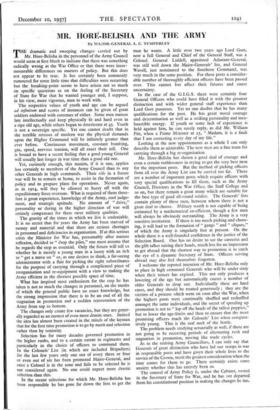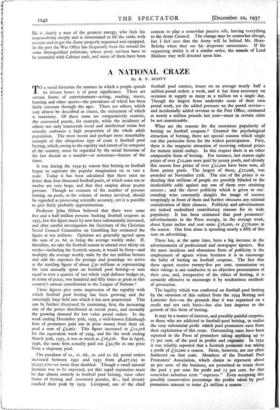MR. HORE-BELISHA AND THE ARMY
By MAJOR-GENERAL A. C. TEMPERLEY
THE dramatic and sweeping changes carried out by Mr. Hore-Belisha in the personnel of the Army Council would seem at first blush to indicate that there was something radically wrong at the War Office or that there were insur- mountable differences on matters of policy. But this does not appear to be true. It has certainly been commonly rumoured for some little time that difficulties were occurring but the breaking-point seems to have arisen not so much on specific questions as on the feeling of the Secretary of State for War that he wanted younger and, I suppose, in his view, more vigorous, men to work with. The respective values of youth and age can be argued ad infinitum and scores of instances can be given of great soldiers endowed with extremes of either. Some men mature late intellectually- and keep -physically fit and hard even in a ripe old age, while others began to deteriorate at 45. Youth is not a sovereign specific. Yet one cannot doubt that in the terrible stiesses of modem war the physical demands upon the Higher Command Will be infinitely greater than ever before. Continuous movement, constant bombing, gas, speed, nervous tension, will all exact their toll. One is bound to have a secret feeling that a good young General will usually last longer in war time than a good old one.
Yet, curiously enough, this maxim, if it is one, applies less certainly to members of the Army Council than to any other Generals in high commands. Their role in a future war will be to remain at home, to assist in the formation of policy and to prepare plans for operations. Never again, as in 1914, will they be allowed to hurry off with the expeditionary force overseas. What is required of them there- fore is great experience, knowledge of the Army, cool judge- ment, and strategic aptitude. No amount of "drive," personality or ' daring in the higher direction of war will entirely compensate for these rarer military qualities.
The gravity of the times in which we live is undeniable. It is no secret that for years the Army has been starved of money and material and that there are serious shortages in personnel and deficiencies in organisation. If at this serious crisis the Minister for War has, presumably after mature reflexion, decided to " drop the pilot," one must assume that he regards the step as essential. Only the future will tell us whether he is merely a young man in a hurry with an itch to "get a move on" or, as one desires to think, a far-seeing administrator with a flair for picking the right subordinates for the purpose of carrying through a complicated piece of reorganisation and re-equipment with a view to making the Army efficient in the shortest possible space of time.
What has inspired most enthusiasm for the step he has taken is not so much the changes in personnel, on the merits of which the general public have no exact knowledge, but the strong impression that there is to be an end of all the stagnation in promotion and a sudden rejuvenation of the Army from top to bottom. • The changes only create few vacancies, but they are gener- ally regarded as an earnest of even more drastic ones. Indeed the idea has almost been created in the minds of the layman that for the first time promotion is to go by merit and selection rather than by seniority.
Selection has for many decades governed promotion in the higher ranks, and to a certain extent in regiments and particularly in the choice of officers to command them. In the Colonels' List (in which are included Brigadiers) for the last few years only one out of every three or four or even out of six has been promoted Major-General, and once a Colonel is in the zone and fails to be selected he is not considered again. No one could expect more drastic selection than this.
In the recent selections for which Mr. Hore-Belisha has been responsible he has gone far down the lists to get the man he wants. A little over two years ago Lord Gort, now a full General and Chief of the General Staff, was a Colonel. General Liddell, appointed Adjutant-General, was still well down the Major-Generals' list, and General Wavell, just nominated to the Southern Command, was very much in the same position. For these posts a consider- able number of thoroughly efficient officers have been passed over. This cannot but affect their futures and cause uncertainty.
In the case of the G.I.G.S. there were certainly four General Officers who could have filled it with the greatest distinction and with wider general staff experience than Lord Gort possesses. Yet no one doubts that he has many qualifications for the post. He has great moral courage and determination as well as a striking personality and inex- haustible energy. If youth or some lack of experience is held against him, he can surely reply, as did Mr. William Pitt, when a Prime Minister at 25, "Madam, it is a fault that I am correcting every day of my life."
Looking at the new appointments as a whole I can only describe them as admirable. The new men are a fine team for carrying through a big re-organisation.
Mr. Hore-Belisha has shown a good deal of courage and even a certain ruthlessness in trying to get the very best men for the important posts. But the method of picking officers from all over the Army List can be carried too far. There are a number of important posts which require officers with very special qualifications to fill them, such as the Army Council, Directors in the War Office, the Staff College and so on, but there remain a great many which are suitable for the best type of good all-round soldier. The Generals' lists contain plenty of these men, between whom there is not a great deal to choose. Military worth is not capable of being estimated by a mathematical co-efficient, though a few men will always be obviously outstanding. The Army is a very sensitive institution. If there is too much picking and choos- ing, it will lead to the formation of" gangs " and "cliques," of which the Army is singularly free at present. On the whole there is a well-founded confidence in the justice of the Selection Board. One has no desire to see the careerist and the glib talker raising their heads, much less for an impression to get abroad that the shortest way to promotion is to catch the eye of a dynamic Secretary of State. Officers serving abroad may also feel themselves forgotten.
I welcome the reputed intention of Mr. Hore-Belisha only to place in high command Generals who will be under sixty when their tenure has expired. This not only produces a lowering of the age but automatically causes a number of older Generals to drop out. Individually these are hard cases, and they should be treated generously ; they are the victims of a process which went on soon after the War, when the highest posts were continually shuffled and reshuffled amongst the same individuals, and the secret of speeding up promotion is not to" lop off the heads of the tallest poppies," but to lower the age-limits and then to ensure that the most promising officers reach the Colonels' List when compara- tively young. This is the real neck of the bottle.
The problem needs studying actuarially as well, if there are not going to be recurring periods of alternating rush and stagnation in promotion, moving like trade cycles. As to the retiring Army Councillors, I can only say that Generals of great distinction who have led our troops in war in responsible posts and have given their whole lives to the service of the Crown, merit the greatest consideration when the time comes for them to go. There certainly exists some anxiety whether this has entirely been so.
The control of Army Policy is, under the Cabinet, vested in the Secretary of State for War, and he has not departed from his constitutional position in making the changes he has. He is clearly a man of the greatest energy, who feels his responsibility deeply and is determined to fill the ranks with recruits and to get the Army properly organised and equipped. In the past the War Office has frequently been the reward for some distinguished politician, whose party services have to be rewarded with Cabinet rank, and many of them have been content to play a somewhat passive role, leaving everything to the Army Council. The change may be somewhat abrupt, but I feel sure that the Army will be behind Mr. Hore- Belisha when they see his desperate earnestness. If his organising ability is of a similar order, the mantle of Lord Haldane may well descend upon him.























































 Previous page
Previous page